Quantitative and Empirical Research vs. Other Types of Research: Quantitative Research
- Quantitative Research
- Other Types of Research
- What Are Scholarly Journal Articles?

P rofessors often want you to use scholarly journal articles for your assignments.
Sometimes, they will require you to use scholarly journal articles that contain quantitative research .

DEFINITIONS
- QUANTITATIVE -
Quantitative research looks at factors that can actually be measured in some way, in other words, quantified . It produces numerical results that can be analyzed statistically.
Quantitative research commonly involves experimentation, surveys, or questionnaires in the context of a large, randomly selected group.
- EMPIRICAL -
The term empirical research is often used as a synonym for quantitative research, but strictly speaking, empirical research is simply any form of research based upon direct observation. It might also be quantitative, but it might not.
PLEASE NOTE: Some professors use these two terms interchangeably. When this occurs, they are usually referring to articles that fit the quantitative description above.
HINT: Don't use the words "quantitative" or "empirical" in your keyword searches. They usually do not appear in article titles, abstracts, or subject words. Instead, check the articles you find to see if some sort of numerical measuring and statistical analysis is present along with the characteristics listed on the right.
CHARACTERISTICS OF QUANTITATIVE RESEARCH
- WHAT TO WATCH FOR -
W atch for these features when determining if an article has quantitative research. They may appear in the abstract, or you may need to skim the text of the article to find them.
- Introduction : a statement of background or purpose (what was being studied and why). May review prior studies on the same topic.
- Description of the design and/or method of the study (the experimental group or sample , control, variables, number of test subjects, test conditions, etc.)
- Results , or report of the findings (in numeric form as tables, charts, or graphs, etc., often with statistical analysis)
- Conclusions that can be drawn from the results (may be labeled discussion or significance )
- Footnotes and/or a bibliography
- Author credentials (degrees earned, where they work, etc.)
SAMPLE QUANTITATIVE RESEARCH ARTICLES
- EXAMPLES -
- Relations Between Trait Impulsivity, Behavioral Impulsivity, Physiological Arousal, and Risky Sexual Behavior Among Young Men
- Nocturnal Heart Rate Variability in Patients Treated with Cognitive–Behavioral Therapy for Insomnia.
- Characterisation of Mainstream and Passive Vapors Emitted by Selected Electronic Cigarettes

- Next: Other Types of Research >>
- Last Updated: Nov 18, 2024 2:37 PM
- URL: https://libguides.csusb.edu/quantitative
Canvas | University | Ask a Librarian
- Library Homepage
- Arrendale Library
Empirical & Non-Empirical Research
- Empirical Research
Introduction: What is Empirical Research?
Quantitative methods, qualitative methods.
- Quantitative vs. Qualitative
- Reference Works for Social Sciences Research
- What is Non-Empirical Research?
- Contact Us!
Call us at 706-776-0111
Chat with a Librarian
Send Us Email
Library Hours
Empirical research is based on phenomena that can be observed and measured. Empirical research derives knowledge from actual experience rather than from theory or belief.
Key characteristics of empirical research include:
- Specific research questions to be answered;
- Definitions of the population, behavior, or phenomena being studied;
- Description of the methodology or research design used to study this population or phenomena, including selection criteria, controls, and testing instruments (such as surveys);
- Two basic research processes or methods in empirical research: quantitative methods and qualitative methods (see the rest of the guide for more about these methods).
(based on the original from the Connelly LIbrary of LaSalle University)

Empirical Research: Qualitative vs. Quantitative
Learn about common types of journal articles that use APA Style, including empirical studies; meta-analyses; literature reviews; and replication, theoretical, and methodological articles.
Academic Writer
© 2024 American Psychological Association.
- More about Academic Writer ...
Quantitative Research
A quantitative research project is characterized by having a population about which the researcher wants to draw conclusions, but it is not possible to collect data on the entire population.
- For an observational study, it is necessary to select a proper, statistical random sample and to use methods of statistical inference to draw conclusions about the population.
- For an experimental study, it is necessary to have a random assignment of subjects to experimental and control groups in order to use methods of statistical inference.
Statistical methods are used in all three stages of a quantitative research project.
For observational studies, the data are collected using statistical sampling theory. Then, the sample data are analyzed using descriptive statistical analysis. Finally, generalizations are made from the sample data to the entire population using statistical inference.
For experimental studies, the subjects are allocated to experimental and control group using randomizing methods. Then, the experimental data are analyzed using descriptive statistical analysis. Finally, just as for observational data, generalizations are made to a larger population.
Iversen, G. (2004). Quantitative research . In M. Lewis-Beck, A. Bryman, & T. Liao (Eds.), Encyclopedia of social science research methods . (pp. 897-898). Thousand Oaks, CA: SAGE Publications, Inc.
Qualitative Research
What makes a work deserving of the label qualitative research is the demonstrable effort to produce richly and relevantly detailed descriptions and particularized interpretations of people and the social, linguistic, material, and other practices and events that shape and are shaped by them.
Qualitative research typically includes, but is not limited to, discerning the perspectives of these people, or what is often referred to as the actor’s point of view. Although both philosophically and methodologically a highly diverse entity, qualitative research is marked by certain defining imperatives that include its case (as opposed to its variable) orientation, sensitivity to cultural and historical context, and reflexivity.
In its many guises, qualitative research is a form of empirical inquiry that typically entails some form of purposive sampling for information-rich cases; in-depth interviews and open-ended interviews, lengthy participant/field observations, and/or document or artifact study; and techniques for analysis and interpretation of data that move beyond the data generated and their surface appearances.
Sandelowski, M. (2004). Qualitative research . In M. Lewis-Beck, A. Bryman, & T. Liao (Eds.), Encyclopedia of social science research methods . (pp. 893-894). Thousand Oaks, CA: SAGE Publications, Inc.
- Next: Quantitative vs. Qualitative >>
- Last Updated: Dec 17, 2024 10:08 AM
- URL: https://library.piedmont.edu/empirical-research
- Ebooks & Online Video
- New Materials
- Renew Checkouts
- Faculty Resources
- Friends of the Library
- Library Services
- Our Mission
- Library History
- Ask a Librarian!
- Making Citations
- Working Online
Arrendale Library Piedmont University 706-776-0111
- Skip to main content
- Skip to primary sidebar
- Skip to footer
- QuestionPro

- Solutions Industries Gaming Automotive Sports and events Education Government Travel & Hospitality Financial Services Healthcare Cannabis Technology Use Case AskWhy Communities Audience Contactless surveys Mobile LivePolls Member Experience GDPR Positive People Science 360 Feedback Surveys
- Resources Blog eBooks Survey Templates Case Studies Training Help center
Home Market Research
Empirical Research: Definition, Methods, Types & Steps
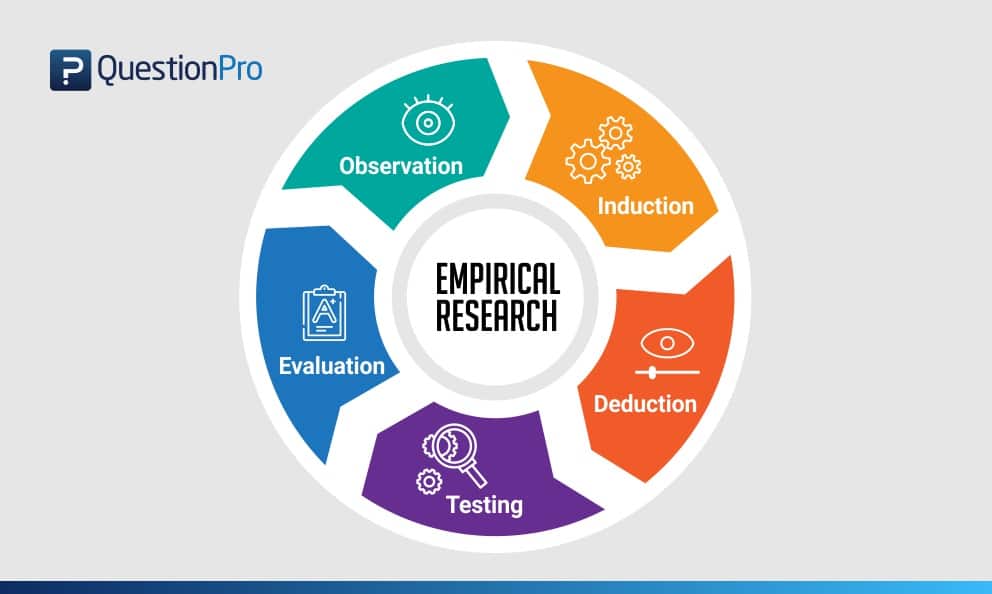
Empirical research is a way of learning through direct observation or experience. Instead of relying on theories or ideas alone, it gathers real-world data to understand how things work.
Researchers ask questions, conduct experiments, observe different situations, and carefully collect evidence to find answers. This method not only ensures that our beliefs are supported by facts but also reassures us that our understanding is based on solid evidence rather than mere assumptions.
In our everyday lives, we engage in informal empirical research whenever we try things and learn from the outcomes, making it an effective and relatable way to uncover the truth.
What is Empirical Research?
Empirical research depends on direct or indirect actual experience and observation as its primary source of knowledge. It focuses on collecting real-world data to answer specific research questions and solve practical problems. This method is widely used across various fields, as it helps professionals validate hypotheses with solid evidence rather than relying on assumptions.
In professional practices, empirical research is vital because it informs decisions with data-driven insights, ensuring that theories are tested and applicable in real-world scenarios.
In addition to advancing knowledge in current studies, empirical research sets a foundation for future studies. By answering specific research questions and testing new hypotheses, it continuously builds on previous findings and opens up new areas for exploration.
This empirical evidence can be gathered using quantitative market research and qualitative market research methods.
For example: A research is being conducted to find out if listening to happy music in the workplace while working may promote creativity? An experiment is conducted by using a music website survey on a set of audience who are exposed to happy music and another set who are not listening to music at all, and the subjects are then observed. The results derived from such a research will give empirical evidence if it does promote creativity or not.
Origin of Empirical Research
You must have heard the quote, “I will not believe it unless I see it.” This concept originated from the ancient empiricists, a fundamental understanding that:
- Powered the emergence of medieval science during the Renaissance period.
- Laid the foundation for modern science as we know it today.
The term “empirical” has its roots in Greek, derived from the word empirics , which means “experienced.”
In today’s world, empirical research refers to:
- The collection of data using evidence gathered through observation or experience.
- Observed and measured phenomena through experiments or by using calibrated scientific instruments.
- Reliance on previous studies and their methodology to design and validate new research.
All of these methods have one key factor in common: dependence on observation and experimentation to collect data, test hypotheses, and draw conclusions.
Empirical research can be categorized into:
- Quantitative research involves numerical data, statistical analysis, and the measurement of variables.
- Qualitative research focuses on non-numerical data and the interpretation of patterns and meanings.
In essence, empirical research relies on real-world evidence to form conclusions, distinguishing it from purely theoretical or speculative approaches.
Types And Methodologies of Empirical Research
Empirical research can be conducted and analysed using qualitative or quantitative methods.
- Quantitative research : Quantitative research methods are used to gather information through numerical data. It is used to quantify opinions, behaviors or other defined variables . These are predetermined and are in a more structured format. Some of the commonly used methods are survey, longitudinal studies, polls, etc
- Qualitative research: Qualitative research methods are used to gather non numerical data. It is used to find meanings, opinions, or the underlying reasons from its subjects. These methods are unstructured or semi structured. The sample size for such a research is usually small and it is a conversational type of method to provide more insight or in-depth information about the problem Some of the most popular forms of methods are focus groups, experiments, interviews, etc.
Data collected from these will need to be analysed. Empirical evidence can also be analysed either quantitatively and qualitatively. Using this, the researcher can answer empirical questions which have to be clearly defined and answerable with the findings he has got.
The type of research design used will vary depending on the field in which it is going to be used. Many of them might choose to do a collective research involving quantitative and qualitative method to better answer questions which cannot be studied in a laboratory setting.
Quantitative Research Methods
Quantitative research methods aid in analyzing the empirical evidence gathered. By using these a researcher can find out if his hypothesis is supported or not.
1. Survey Research
Survey research generally involves a large audience to collect a large amount of data. This is a quantitative method having a predetermined set of closed questions which are pretty easy to answer. Because of the simplicity of such a method, high responses are achieved. It is one of the most commonly used methods for all kinds of research in today’s world.
Previously, surveys were taken face to face only with maybe a recorder. However, with advancement in technology and for ease, new mediums such as emails , or social media have emerged.
For example: Depletion of energy resources is a growing concern and hence there is a need for awareness about renewable energy. According to recent studies, fossil fuels still account for around 80% of energy consumption in the United States. Even though there is a rise in the use of green energy every year, there are certain parameters because of which the general population is still not opting for green energy.
In order to understand why, a survey can be conducted to gather opinions of the general population about green energy and the factors that influence their choice of switching to renewable energy. Such a survey can help institutions or governing bodies to promote appropriate awareness and incentive schemes to push the use of greener energy.
2. Experimental Research
In experimental research , an experiment is set up and a hypothesis is tested by creating a situation in which one of the variable is manipulated. This is also used to check cause and effect. It is tested to see what happens to the independent variable if the other one is removed or altered. The process for such a method is usually proposing a hypothesis, experimenting on it, analyzing the findings and reporting the findings to understand if it supports the theory or not.
For example: A particular product company is trying to find what is the reason for them to not be able to capture the market. So the organisation makes changes in each one of the processes like manufacturing, marketing, sales and operations. Through the experiment they understand that sales training directly impacts the market coverage for their product. If the person is trained well, then the product will have better coverage.
3. Correlational Research
Correlational research is used to find relation between two set of variables . Regression analysis is generally used to predict outcomes of such a method. It can be positive, negative or neutral correlation.
For example: Higher educated individuals will get higher paying jobs. This means higher education enables the individual to high paying job and less education will lead to lower paying jobs.
4. Longitudinal Study
Longitudinal study is used to understand the traits or behavior of a subject under observation after repeatedly testing the subject over a period of time. Data collected from such a method can be qualitative or quantitative in nature.
For example: A research to find out benefits of exercise. The target is asked to exercise everyday for a particular period of time and the results show higher endurance, stamina, and muscle growth. This supports the fact that exercise benefits an individual body.
5. Cross Sectional
Cross sectional study is an observational type of method, in which a set of audience is observed at a given point in time. In this type, the set of people are chosen in a fashion which depicts similarity in all the variables except the one which is being researched.
This type does not enable the researcher to establish a cause and effect relationship as it is not observed for a continuous time period. It is majorly used by healthcare sector or the retail industry.
For example: A medical study to find the prevalence of under-nutrition disorders in kids of a given population. This will involve looking at a wide range of parameters like age, ethnicity, location, incomes and social backgrounds. If a significant number of kids coming from poor families show under-nutrition disorders, the researcher can further investigate into it. Usually a cross sectional study is followed by a longitudinal study to find out the exact reason.
6. Causal-Comparative Research
This method is based on comparison. It is mainly used to find out cause-effect relationship between two variables or even multiple variables.
For example: A researcher measured the productivity of employees in a company which gave breaks to the employees during work and compared that to the employees of the company which did not give breaks at all.
Qualitative Research Methods
Some research questions need to be analysed qualitatively, as quantitative methods are not applicable there. In many cases, in-depth information is needed or a researcher may need to observe a target audience behavior, hence the results needed are in a descriptive analysis form. Qualitative research results will be descriptive rather than predictive. It enables the researcher to build or support theories for future potential quantitative research. In such a situation qualitative research methods are used to derive a conclusion to support the theory or hypothesis being studied.
1. Case Study
Case study method is used to find more information through carefully analyzing existing cases. It is very often used for business research or to gather empirical evidence for investigation purpose. It is a method to investigate a problem within its real life context through existing cases.
The researcher has to carefully analyse making sure the parameter and variables in the existing case are the same as to the case that is being investigated. Using the findings from the case study, conclusions can be drawn regarding the topic that is being studied.
For example: A report mentioning the solution provided by a company to its client. The challenges they faced during initiation and deployment, the findings of the case and solutions they offered for the problems. Such case studies are used by most companies as it forms an empirical evidence for the company to promote in order to get more business.
2. Observational Method
Observational method is a process to observe and gather data from its target. Since it is a qualitative method it is time consuming and very personal. It can be said that observational research method is a part of ethnographic research which is also used to gather empirical evidence. This is usually a qualitative form of research, however in some cases it can be quantitative as well depending on what is being studied.
For example: setting up a research to observe a particular animal in the rain-forests of amazon. Such a research usually take a lot of time as observation has to be done for a set amount of time to study patterns or behavior of the subject. Another example used widely nowadays is to observe people shopping in a mall to figure out buying behavior of consumers.
3. One-on-one Interview
Such a method is purely qualitative and one of the most widely used. The reason being it enables a researcher get precise meaningful data if the right questions are asked. It is a conversational method where in-depth data can be gathered depending on where the conversation leads.
For example: A one-on-one interview with the finance minister to gather data on financial policies of the country and its implications on the public.
4. Focus Groups
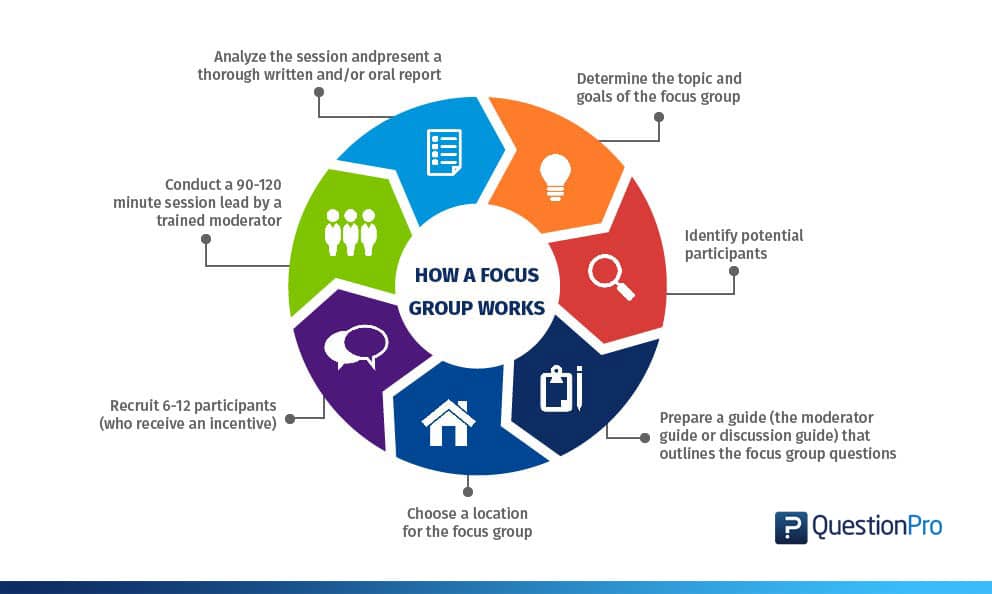
Focus groups are used when a researcher wants to find answers to why, what and how questions. A small group is generally chosen for such a method and it is not necessary to interact with the group in person. A moderator is generally needed in case the group is being addressed in person. This is widely used by product companies to collect data about their brands and the product.
For example: A mobile phone manufacturer wanting to have a feedback on the dimensions of one of their models which is yet to be launched. Such studies help the company meet the demand of the customer and position their model appropriately in the market.
5. Text Analysis
Text analysis method is a little new compared to the other types. Such a method is used to analyse social life by going through images or words used by the individual. In today’s world, with social media playing a major part of everyone’s life, such a method enables the research to follow the pattern that relates to his study.
For example: A lot of companies ask for feedback from the customer in detail mentioning how satisfied are they with their customer support team. Such data enables the researcher to take appropriate decisions to make their support team better.
Sometimes a combination of the methods is also needed for some questions that cannot be answered using only one type of method especially when a researcher needs to gain a complete understanding of complex subject matter.
We recently published a blog that talks about examples of qualitative data in education ; why don’t you check it out for more ideas?
Learn More: Data Collection Methods: Types & Examples
Steps of Conducting Empirical Research
Since empirical research is based on observation and capturing experiences, it is important to plan the steps to conduct the experiment and how to analyse it. This will enable the researcher to resolve problems or obstacles which can occur during the experiment.
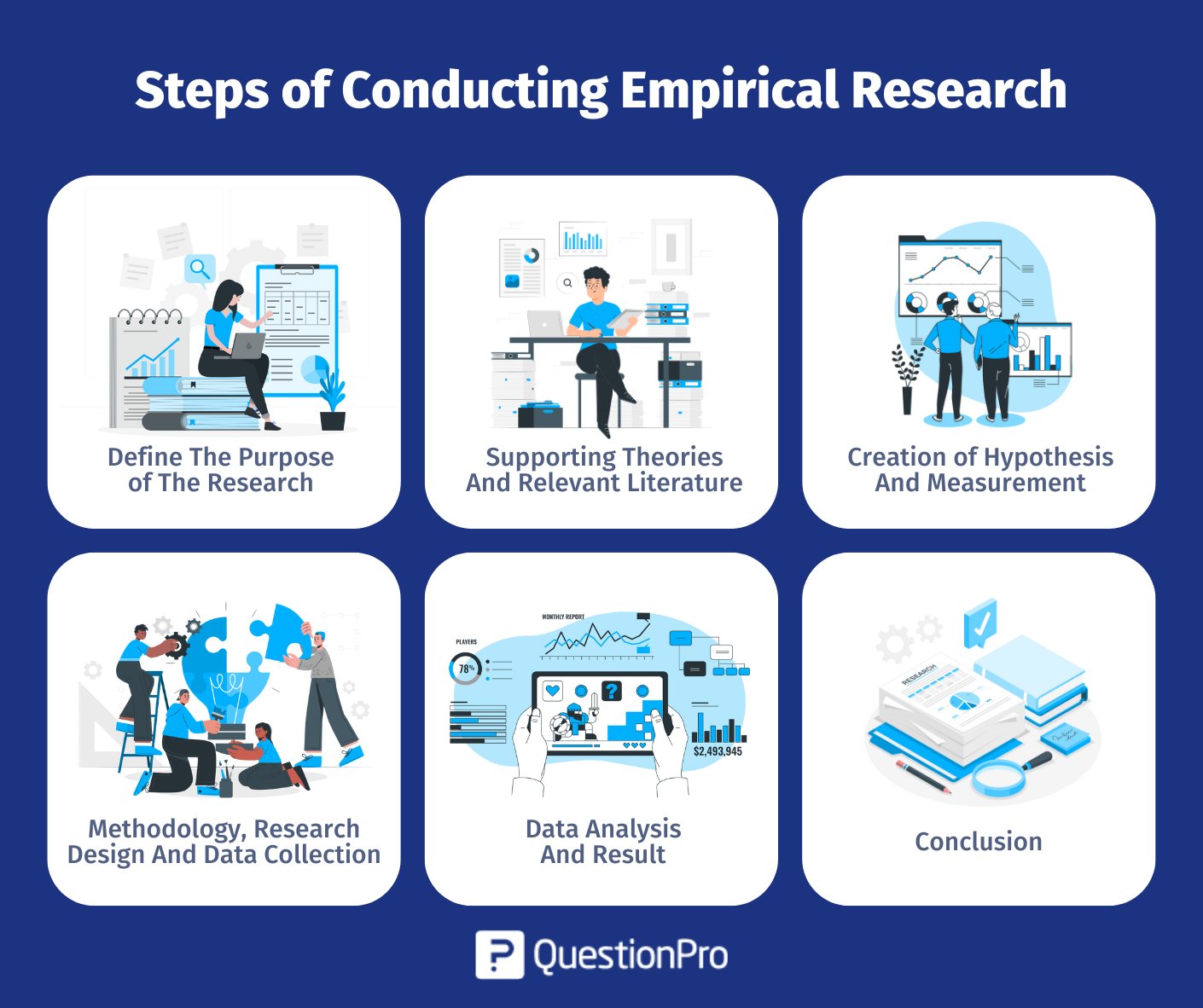
Step #1: Define The Purpose of The Research
This is the step where the researcher has to answer questions like what exactly do I want to find out? What is the problem statement? Are there any issues in terms of the availability of knowledge, data, time or resources. Will this research be more beneficial than what it will cost.
Before going ahead, a researcher has to clearly define his purpose for the research and set up a plan to carry out further tasks.
Step #2 : Supporting Theories And Relevant Literature
The researcher needs to find out if there are theories which can be linked to his research problem . He has to figure out if any theory can help him support his findings. All kind of relevant literature will help the researcher to find if there are others who have researched this before, or what are the problems faced during this research. The researcher will also have to set up assumptions and also find out if there is any history regarding his research problem
Step #3: Creation of Hypothesis And Measurement
Before beginning the actual research he needs to provide himself a working hypothesis or guess what will be the probable result. Researcher has to set up variables, decide the environment for the research and find out how can he relate between the variables.
Researcher will also need to define the units of measurements, tolerable degree for errors, and find out if the measurement chosen will be acceptable by others.
Step #4: Methodology, Research Design And Data Collection
In this step, the researcher has to define a strategy for conducting his research. He has to set up experiments to collect data which will enable him to propose the hypothesis. The researcher will decide whether he will need experimental or non experimental method for conducting the research. The type of research design will vary depending on the field in which the research is being conducted.
Last but not the least, the researcher will have to find out parameters that will affect the validity of the research design. Data collection will need to be done by choosing appropriate samples depending on the research question. To carry out the research, he can use one of the many sampling techniques. Once data collection is complete, researcher will have empirical data which needs to be analysed.
Step #5: Data Analysis And Result
Data analysis can be done in two ways, qualitatively and quantitatively. Researcher will need to find out what qualitative method or quantitative method will be needed or will he need a combination of both. Depending on the unit of analysis of his data, he will know if his hypothesis is supported or rejected. Analyzing this data is the most important part to support his hypothesis.
Step #6: Conclusion
A report will need to be made with the findings of the research. The researcher can give the theories and literature that support his research. He can make suggestions or recommendations for further research on his topic.
Empirical Research Methodology Cycle
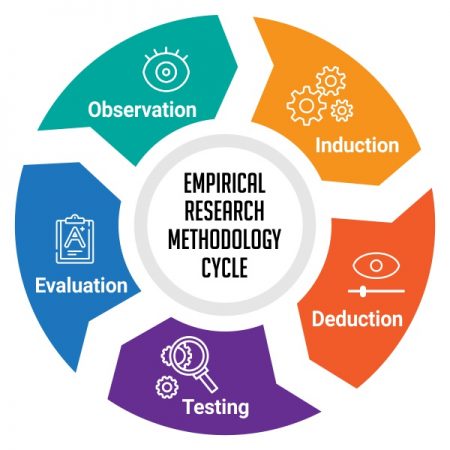
A.D. de Groot, a famous dutch psychologist and a chess expert conducted some of the most notable experiments using chess in the 1940’s. During his study, he came up with a cycle which is consistent and now widely used to conduct empirical research. It consists of 5 phases with each phase being as important as the next one.
The empirical cycle captures the process of coming up with hypothesis about how certain subjects work or behave and then testing these hypothesis against empirical data in a systematic and rigorous approach. It can be said that it characterizes the deductive approach to science. Following is the empirical cycle.
1. Observation
At this phase an idea is sparked for proposing a hypothesis. During this phase empirical data is gathered using observation. For example: a particular species of flower bloom in a different color only during a specific season.
2. Induction
Inductive reasoning is then carried out to form a general conclusion from the data gathered through observation. For example: As stated above it is observed that the species of flower blooms in a different color during a specific season. A researcher may ask a question “does the temperature in the season cause the color change in the flower?” He can assume that is the case, however it is a mere conjecture and hence an experiment needs to be set up to support this hypothesis. So he tags a few set of flowers kept at a different temperature and observes if they still change the color?
3. Deduction
This phase helps the researcher to deduce a conclusion out of his experiment. This has to be based on logic and rationality to come up with specific unbiased results.For example: In the experiment, if the tagged flowers in a different temperature environment do not change the color then it can be concluded that temperature plays a role in changing the color of the bloom.
This phase involves the researcher to return to empirical methods to put his hypothesis to the testing instruments. The researcher now needs to make sense of his data and hence needs to use statistical analysis plans to determine the temperature and bloom color relationship. If the researcher finds out that most flowers bloom a different color when exposed to the certain temperature and the others do not when the temperature is different, he has found support to his hypothesis. Please note this not proof but just a support to his hypothesis.
5. Evaluation
This phase is generally forgotten by most but is an important one to keep gaining knowledge. During this phase the researcher puts forth the data he has collected, the support argument and his conclusion. The researcher also states the limitations for the experiment and his hypothesis and suggests tips for others to pick it up and continue a more in-depth research for others in the future.
Pros and Cons of Empirical Research
As you may have noticed, empirical research has a lot to offer anyone who wants to conduct research and take advantage of its benefits. However, it is essential to consider not only the benefits but also the limitations and possible disadvantages you may encounter when using this methodology.
Below, we will explain both aspects a bit more so that you can consider them when conducting your research using this method.
Advantages of Empirical Research
There is a reason why empirical research is one of the most widely used method. There are a few advantages associated with it. Following are a few of them.
- It is used to authenticate traditional research through various experiments and observations.
- This research methodology makes the research being conducted more competent and authentic.
- It enables a researcher understand the dynamic changes that can happen and change his strategy accordingly.
- The level of control in such a research is high so the researcher can control multiple variables.
- It plays a vital role in increasing internal validity .
Disadvantages of Empirical Research
Even though empirical research makes the research more competent and authentic, it does have a few disadvantages. Following are a few of them.
- Such a research needs patience as it can be very time consuming. The researcher has to collect data from multiple sources and the parameters involved are quite a few, which will lead to a time consuming research.
- Most of the time, a researcher will need to conduct research at different locations or in different environments, this can lead to an expensive affair.
- There are a few rules in which experiments can be performed and hence permissions are needed. Many a times, it is very difficult to get certain permissions to carry out different methods of this research.
- Collection of data can be a problem sometimes, as it has to be collected from a variety of sources through different methods.
Empirical Research Vs Non-Empirical Research
Empirical and non-empirical research are two fundamental approaches in research methodology. Understanding their key differences helps researchers choose the appropriate method based on their research objectives.
Both empirical and non-empirical research offers valuable insights and contribute uniquely to knowledge. Together, they form a comprehensive approach to exploring, explaining, and expanding knowledge across disciplines.
Why is There a Need for Empirical Research?
Empirical research is important today because most people believe in something only when they can see, hear, or experience it. It is used to validate multiple hypotheses, derive knowledge, and increase human understanding, and it is continuing to do so to advance in various fields.
This often involves using testing instruments to ensure the accuracy and reliability of data collection, especially when it comes to complex variables.
In addition, research participants’ discussion often plays a key role in understanding the results and validating the findings within a theoretical framework that guides the entire study.
Qualitative methods are frequently used to gain deeper insights into participants’ perspectives, helping to contextualize empirical data. A literature review, or multiple literature reviews, also helps ground the research in existing knowledge, linking the new findings with past studies.
For example , pharmaceutical companies use empirical research to test specific drugs on controlled or random groups, using both qualitative methods and testing instruments to study cause and effect. This way, they prove certain theories they had proposed for the specific drug.
Such research is very important, as sometimes it can lead to finding a cure for a long-standing disease. In addition, the use of statistical data is essential for validating results and ensuring their reliability. Empirical research is useful in science, social sciences, business, and many other fields, like history, deriving knowledge through quantitative and qualitative methods.

Use QuestionPro Research Suite for Empirical Research
Using QuestionPro Research Suite for empirical research makes the process easier and more efficient. Here’s why:

01. User-Friendly Data Collection Tools
QuestionPro’s suite of tools, including surveys, polls, and questionnaires, are designed with user-friendliness in mind, making it a breeze to gather real-world data from diverse sources.
02. Highly Customizable
This lets you personalize surveys per your research requirements, ensuring the collected data is always relevant and valuable.
03. Real-Time Analytics
Get immediate feedback with QuestionPro real-time analytics to see trends and patterns in your data immediately
4. Even Better Data Management
The most efficient way of managing large sets of data is to keep the analysis and its outcomes faster and more reliable.
Overall, QuestionPro simplifies the empirical research process and allows you to focus more on data analysis and interpretation than manual collection and organization.
Conclusion About Empirical Research
Empirical research is a tool for understanding data and deducing its meaning. By focusing on what can be measured or experienced, we are better equipped to think critically and develop practical solutions.
When identifying empirical research, we focus on real-world data and its key characteristics, such as observation, experimentation, and evidence-based conclusions. The research process involves careful data collection, analysis, and the ability to communicate empirical research findings.
In doing so, we can make sense of the data and our feelings, leading to more informed decisions. Ultimately, empirical research enables us to transition from mere assumptions to solid evidence. Identifying patterns and validating hypotheses can improve outcomes in scientific and daily fields.
LEARN MORE FREE TRIAL
Frequently Asked Questions( FAQs)
Empirical research is a type of study that relies on observation, experience, or experimentation to gather data. It involves collecting evidence through direct or indirect observation of real-world phenomena and analyzing that data to form conclusions, often using scientific methods such as experiments or surveys.
Examples of empirical research include: 1. Conducting experiments to test a scientific hypothesis. 2. Surveying individuals to gather opinions or behaviors. 3. Observing wildlife in their natural environment. 4. Measuring the effects of a treatment in a clinical trial. 5. Analyzing historical data to identify trends or patterns.
Empirical research relies on observation and data collection through experiments or real-world evidence, whether quantitative (numerical) or qualitative (non-numerical). Qualitative research , a subset of empirical research, focuses specifically on understanding patterns, behaviors, and experiences through non-numerical data like interviews, observations, or texts.
MORE LIKE THIS
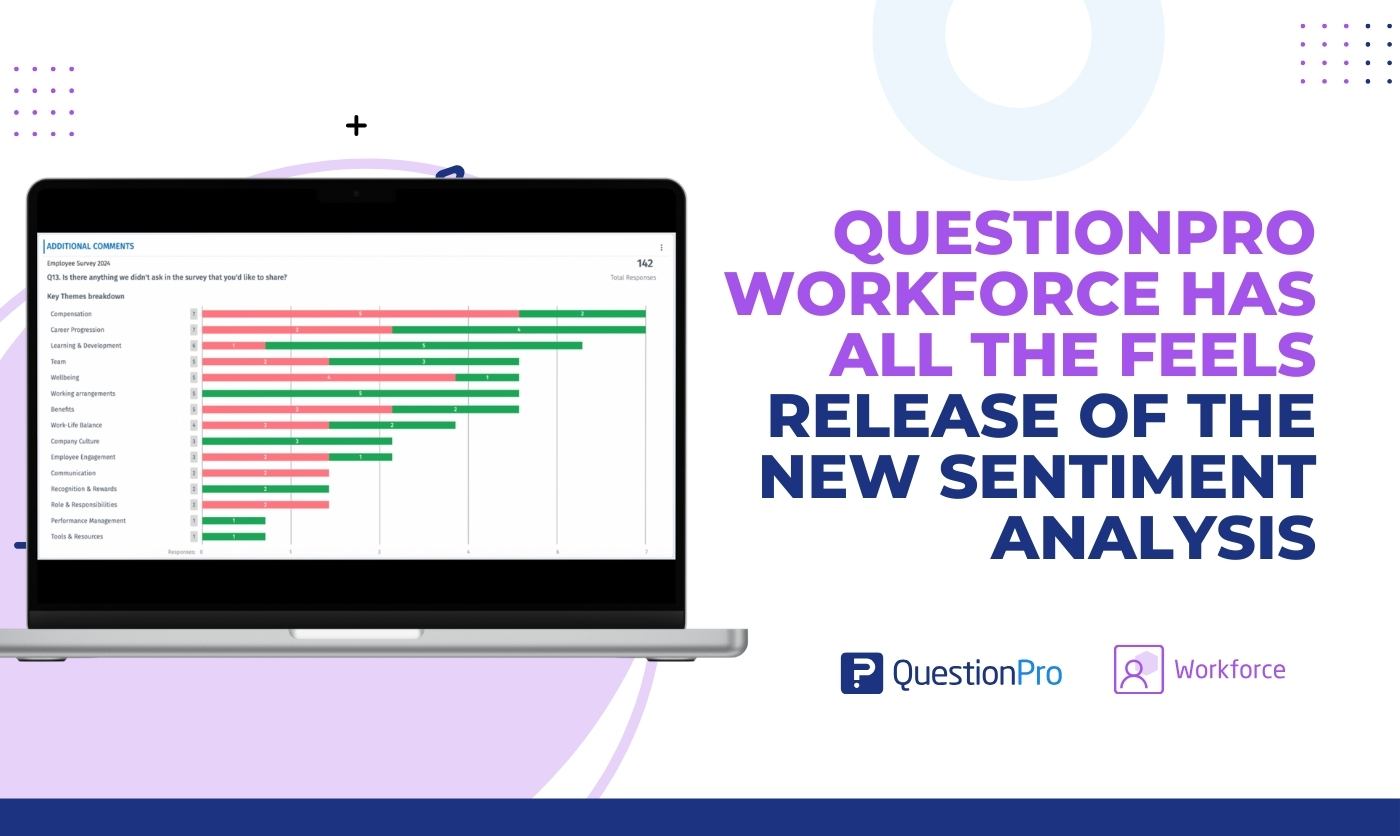
QuestionPro Workforce Has All The Feels – Release of the New Sentiment Analysis
Dec 19, 2024

The Impact Of Synthetic Data On Modern Research

Companies are losing $ billions with gaps in market research – are you?
Dec 18, 2024
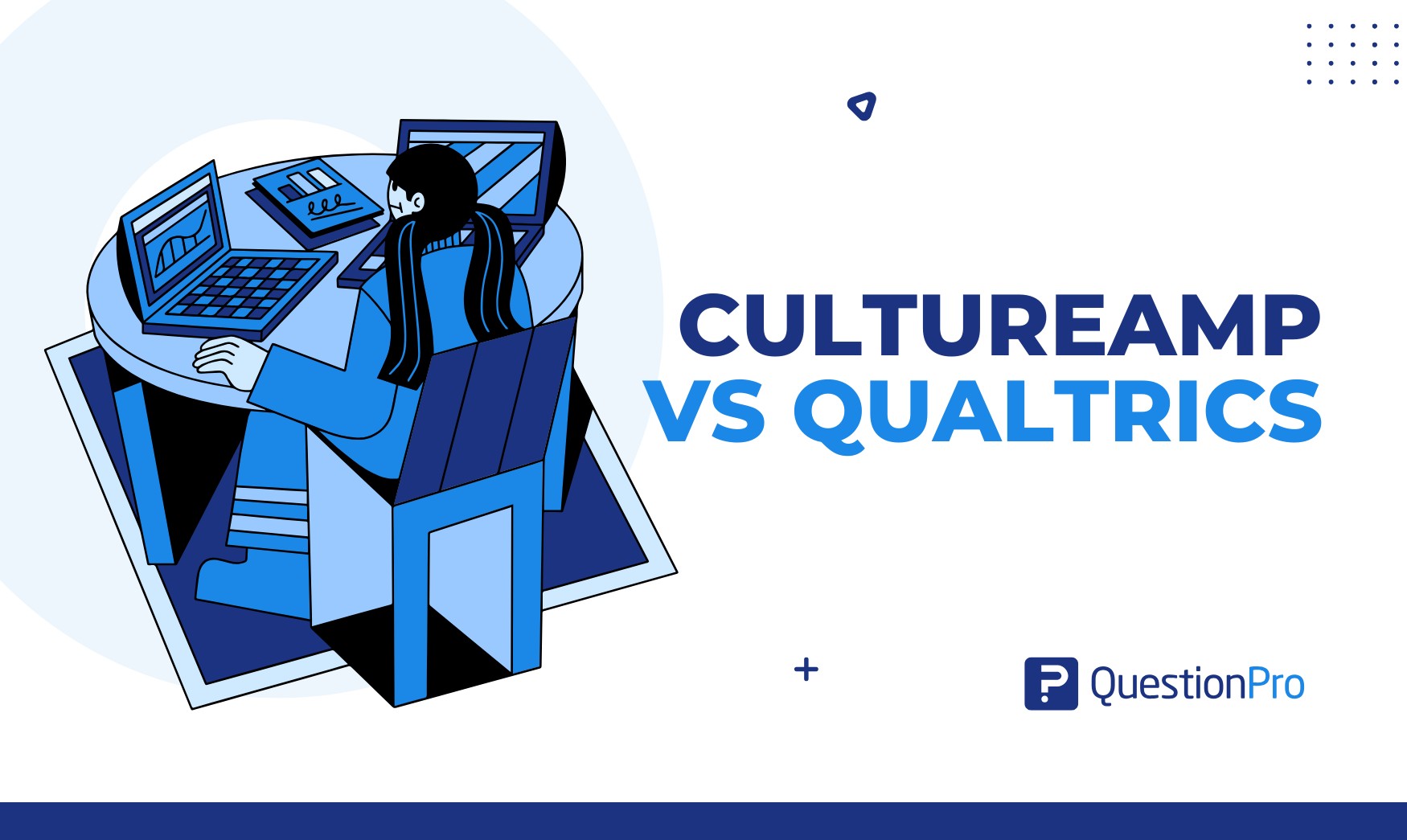
CultureAmp vs Qualtrics: The Best Employee Experience Platform
Dec 16, 2024
Other categories
- Academic Research
- Artificial Intelligence
- Assessments
- Brand Awareness
- Case Studies
- Communities
- Consumer Insights
- Customer effort score
- Customer Engagement
- Customer Experience
- Customer Loyalty
- Customer Research
- Customer Satisfaction
- Employee Benefits
- Employee Engagement
- Employee Retention
- Friday Five
- General Data Protection Regulation
- Insights Hub
- Life@QuestionPro
- Market Research
- Mobile diaries
- Mobile Surveys
- New Features
- Online Communities
- Question Types
- Questionnaire
- QuestionPro Products
- Release Notes
- Research Tools and Apps
- Revenue at Risk
- Survey Templates
- Training Tips
- Tuesday CX Thoughts (TCXT)
- Uncategorized
- What’s Coming Up
- Workforce Intelligence
La Salle University
Connelly library, library main menu.
- Find Course Reserves
- Interlibrary Loan (ILL)
- Study Room Use & Reservations
- Technology & Printing
- Citation Guides
- Place Course Reserves
- Reserve Library Space
- Request Instruction
- Copyright Information
- Guides for Faculty
Special Collections
- University Archives
- Historical & Cultural Collections
- Rare Bibles & Prayer Books
- Historical Research Guides
- Information & Guidelines
- Staff Directory
- Meet with a Librarian
- Directions & Building Maps
Research Hub
- Research Tools
- Research Guides
The Connelly Library is transitioning from Digital Commons to a new institutional repository. There will be a period of time during which access is not available, beginning Monday 10/21/2024. Please reach out to [email protected] with any questions.
Qualitative and Quantitative Research
What is "empirical research".
- empirical research
- Locating Articles in Cinahl and PsycInfo
- Locating Articles in PubMed
- Getting the Articles This link opens in a new window
Empirical research is based on observed and measured phenomena and derives knowledge from actual experience rather than from theory or belief.
How do you know if a study is empirical? Read the subheadings within the article, book, or report and look for a description of the research "methodology." Ask yourself: Could I recreate this study and test these results?
Key characteristics to look for:
- Specific research questions to be answered
- Definition of the population, behavior, or phenomena being studied
- Description of the process used to study this population or phenomena, including selection criteria, controls, and testing instruments (such as surveys)
Another hint: some scholarly journals use a specific layout, called the "IMRaD" format, to communicate empirical research findings. Such articles typically have 4 components:
- Introduction : sometimes called "literature review" -- what is currently known about the topic -- usually includes a theoretical framework and/or discussion of previous studies
- Methodology : sometimes called "research design" -- how to recreate the study -- usually describes the population, research process, and analytical tools
- Results : sometimes called "findings" -- what was learned through the study -- usually appears as statistical data or as substantial quotations from research participants
- Discussion : sometimes called "conclusion" or "implications" -- why the study is important -- usually describes how the research results influence professional practices or future studies
- << Previous: Home
- Next: Locating Articles in Cinahl and PsycInfo >>
Chat Assistance

- University of Memphis Libraries
- Research Guides
Empirical Research: Defining, Identifying, & Finding
Defining empirical research, what is empirical research, quantitative or qualitative.
- Introduction
- Database Tools
- Search Terms
- Image Descriptions
Calfee & Chambliss (2005) (UofM login required) describe empirical research as a "systematic approach for answering certain types of questions." Those questions are answered "[t]hrough the collection of evidence under carefully defined and replicable conditions" (p. 43).
The evidence collected during empirical research is often referred to as "data."
Characteristics of Empirical Research
Emerald Publishing's guide to conducting empirical research identifies a number of common elements to empirical research:
- A research question , which will determine research objectives.
- A particular and planned design for the research, which will depend on the question and which will find ways of answering it with appropriate use of resources.
- The gathering of primary data , which is then analysed.
- A particular methodology for collecting and analysing the data, such as an experiment or survey.
- The limitation of the data to a particular group, area or time scale, known as a sample [emphasis added]: for example, a specific number of employees of a particular company type, or all users of a library over a given time scale. The sample should be somehow representative of a wider population.
- The ability to recreate the study and test the results. This is known as reliability .
- The ability to generalize from the findings to a larger sample and to other situations.
If you see these elements in a research article, you can feel confident that you have found empirical research. Emerald's guide goes into more detail on each element.
Empirical research methodologies can be described as quantitative, qualitative, or a mix of both (usually called mixed-methods).
Ruane (2016) (UofM login required) gets at the basic differences in approach between quantitative and qualitative research:
- Quantitative research -- an approach to documenting reality that relies heavily on numbers both for the measurement of variables and for data analysis (p. 33).
- Qualitative research -- an approach to documenting reality that relies on words and images as the primary data source (p. 33).
Both quantitative and qualitative methods are empirical . If you can recognize that a research study is quantitative or qualitative study, then you have also recognized that it is empirical study.
Below are information on the characteristics of quantitative and qualitative research. This video from Scribbr also offers a good overall introduction to the two approaches to research methodology:
Characteristics of Quantitative Research
Researchers test hypotheses, or theories, based in assumptions about causality, i.e. we expect variable X to cause variable Y. Variables have to be controlled as much as possible to ensure validity. The results explain the relationship between the variables. Measures are based in pre-defined instruments.
Examples: experimental or quasi-experimental design, pretest & post-test, survey or questionnaire with closed-ended questions. Studies that identify factors that influence an outcomes, the utility of an intervention, or understanding predictors of outcomes.
Characteristics of Qualitative Research
Researchers explore “meaning individuals or groups ascribe to social or human problems (Creswell & Creswell, 2018, p3).” Questions and procedures emerge rather than being prescribed. Complexity, nuance, and individual meaning are valued. Research is both inductive and deductive. Data sources are multiple and varied, i.e. interviews, observations, documents, photographs, etc. The researcher is a key instrument and must be reflective of their background, culture, and experiences as influential of the research.
Examples: open question interviews and surveys, focus groups, case studies, grounded theory, ethnography, discourse analysis, narrative, phenomenology, participatory action research.
Calfee, R. C. & Chambliss, M. (2005). The design of empirical research. In J. Flood, D. Lapp, J. R. Squire, & J. Jensen (Eds.), Methods of research on teaching the English language arts: The methodology chapters from the handbook of research on teaching the English language arts (pp. 43-78). Routledge. http://ezproxy.memphis.edu/login?url=http://search.ebscohost.com/login.aspx?direct=true&db=nlebk&AN=125955&site=eds-live&scope=site .
Creswell, J. W., & Creswell, J. D. (2018). Research design: Qualitative, quantitative, and mixed methods approaches (5th ed.). Thousand Oaks: Sage.
How to... conduct empirical research . (n.d.). Emerald Publishing. https://www.emeraldgrouppublishing.com/how-to/research-methods/conduct-empirical-research .
Scribbr. (2019). Quantitative vs. qualitative: The differences explained [video]. YouTube. https://www.youtube.com/watch?v=a-XtVF7Bofg .
Ruane, J. M. (2016). Introducing social research methods : Essentials for getting the edge . Wiley-Blackwell. http://ezproxy.memphis.edu/login?url=http://search.ebscohost.com/login.aspx?direct=true&db=nlebk&AN=1107215&site=eds-live&scope=site .
- << Previous: Home
- Next: Identifying Empirical Research >>
- Last Updated: Apr 2, 2024 11:25 AM
- URL: https://libguides.memphis.edu/empirical-research

Empirical Research: A Comprehensive Guide for Academics

Empirical research relies on gathering and studying real, observable data. The term ’empirical’ comes from the Greek word ’empeirikos,’ meaning ‘experienced’ or ‘based on experience.’ So, what is empirical research? Instead of using theories or opinions, empirical research depends on real data obtained through direct observation or experimentation.
Why Empirical Research?
Empirical research plays a key role in checking or improving current theories, providing a systematic way to grow knowledge across different areas. By focusing on objectivity, it makes research findings more trustworthy, which is critical in research fields like medicine, psychology, economics, and public policy. In the end, the strengths of empirical research lie in deepening our awareness of the world and improving our capacity to tackle problems wisely. 1,2
Qualitative and Quantitative Methods
There are two main types of empirical research methods – qualitative and quantitative. 3,4 Qualitative research delves into intricate phenomena using non-numerical data, such as interviews or observations, to offer in-depth insights into human experiences. In contrast, quantitative research analyzes numerical data to spot patterns and relationships, aiming for objectivity and the ability to apply findings to a wider context.
Steps for Conducting Empirical Research
When it comes to conducting research, there are some simple steps that researchers can follow. 5,6
- Create Research Hypothesis: Clearly state the specific question you want to answer or the hypothesis you want to explore in your study.
- Examine Existing Research: Read and study existing research on your topic. Understand what’s already known, identify existing gaps in knowledge, and create a framework for your own study based on what you learn.
- Plan Your Study: Decide how you’ll conduct your research—whether through qualitative methods, quantitative methods, or a mix of both. Choose suitable techniques like surveys, experiments, interviews, or observations based on your research question.
- Develop Research Instruments: Create reliable research collection tools, such as surveys or questionnaires, to help you collate data. Ensure these tools are well-designed and effective.
- Collect Data: Systematically gather the information you need for your research according to your study design and protocols using the chosen research methods.
- Data Analysis: Analyze the collected data using suitable statistical or qualitative methods that align with your research question and objectives.
- Interpret Results: Understand and explain the significance of your analysis results in the context of your research question or hypothesis.
- Draw Conclusions: Summarize your findings and draw conclusions based on the evidence. Acknowledge any study limitations and propose areas for future research.
Advantages of Empirical Research
Empirical research is valuable because it stays objective by relying on observable data, lessening the impact of personal biases. This objectivity boosts the trustworthiness of research findings. Also, using precise quantitative methods helps in accurate measurement and statistical analysis. This precision ensures researchers can draw reliable conclusions from numerical data, strengthening our understanding of the studied phenomena. 4
Disadvantages of Empirical Research
While empirical research has notable strengths, researchers must also be aware of its limitations when deciding on the right research method for their study.4 One significant drawback of empirical research is the risk of oversimplifying complex phenomena, especially when relying solely on quantitative methods. These methods may struggle to capture the richness and nuances present in certain social, cultural, or psychological contexts. Another challenge is the potential for confounding variables or biases during data collection, impacting result accuracy.
Tips for Empirical Writing
In empirical research, the writing is usually done in research papers, articles, or reports. The empirical writing follows a set structure, and each section has a specific role. Here are some tips for your empirical writing. 7
- Define Your Objectives: When you write about your research, start by making your goals clear. Explain what you want to find out or prove in a simple and direct way. This helps guide your research and lets others know what you have set out to achieve.
- Be Specific in Your Literature Review: In the part where you talk about what others have studied before you, focus on research that directly relates to your research question. Keep it short and pick studies that help explain why your research is important. This part sets the stage for your work.
- Explain Your Methods Clearly : When you talk about how you did your research (Methods), explain it in detail. Be clear about your research plan, who took part, and what you did; this helps others understand and trust your study. Also, be honest about any rules you follow to make sure your study is ethical and reproducible.
- Share Your Results Clearly : After doing your empirical research, share what you found in a simple way. Use tables or graphs to make it easier for your audience to understand your research. Also, talk about any numbers you found and clearly state if they are important or not. Ensure that others can see why your research findings matter.
- Talk About What Your Findings Mean: In the part where you discuss your research results, explain what they mean. Discuss why your findings are important and if they connect to what others have found before. Be honest about any problems with your study and suggest ideas for more research in the future.
- Wrap It Up Clearly: Finally, end your empirical research paper by summarizing what you found and why it’s important. Remind everyone why your study matters. Keep your writing clear and fix any mistakes before you share it. Ask someone you trust to read it and give you feedback before you finish.
References:
- Empirical Research in the Social Sciences and Education, Penn State University Libraries. Available online at https://guides.libraries.psu.edu/emp
- How to conduct empirical research, Emerald Publishing. Available online at https://www.emeraldgrouppublishing.com/how-to/research-methods/conduct-empirical-research
- Empirical Research: Quantitative & Qualitative, Arrendale Library, Piedmont University. Available online at https://library.piedmont.edu/empirical-research
- Bouchrika, I. What Is Empirical Research? Definition, Types & Samples in 2024. Research.com, January 2024. Available online at https://research.com/research/what-is-empirical-research
- Quantitative and Empirical Research vs. Other Types of Research. California State University, April 2023. Available online at https://libguides.csusb.edu/quantitative
- Empirical Research, Definitions, Methods, Types and Examples, Studocu.com website. Available online at https://www.studocu.com/row/document/uganda-christian-university/it-research-methods/emperical-research-definitions-methods-types-and-examples/55333816
- Writing an Empirical Paper in APA Style. Psychology Writing Center, University of Washington. Available online at https://psych.uw.edu/storage/writing_center/APApaper.pdf
Paperpal is an AI writing assistant that help academics write better, faster with real-time suggestions for in-depth language and grammar correction. Trained on millions of research manuscripts enhanced by professional academic editors, Paperpal delivers human precision at machine speed.
Try it for free or upgrade to Paperpal Prime , which unlocks unlimited access to premium features like academic translation, paraphrasing, contextual synonyms, consistency checks and more. It’s like always having a professional academic editor by your side! Go beyond limitations and experience the future of academic writing. Get Paperpal Prime now at just US$19 a month!
Related Reads:
- How to Write a Scientific Paper in 10 Steps
- What is a Literature Review? How to Write It (with Examples)
- What is an Argumentative Essay? How to Write It (With Examples)
- Ethical Research Practices For Research with Human Subjects
Ethics in Science: Importance, Principles & Guidelines
Presenting research data effectively through tables and figures, you may also like, how to write a thematic literature review, conceptual framework vs theoretical framework – difference and..., chicago style citation guide: understanding the chicago manual..., what is the purpose of an abstract why..., research process steps: research procedure and examples, what are citation styles which citation style to..., what are the types of literature reviews , what are research skills definition, importance, and examples , what is phd dissertation defense and how to..., abstract vs introduction: what is the difference .

Research Basics - All Subjects
- Getting Started
- Evaluating Resources
- Generating Search Terms
- Citations, Copyright, Plagiarism
- What is AI Plagiarism?
- Physical Library Resources
- Digital Library Resources
- Videos / Tutorials on Search Skills
- Primary Sources (Social Sciences & Humanities)
- Subject Guides: Find your Major This link opens in a new window
- Open Educational Resources (OER) This link opens in a new window
Empirical Studies
Quantitative Research
Qualitative Research
Mixed Methods Research
- Writing Resources - How to Write Scholarly Papers
Montgomery Library at Campbellsville University does not necessarily endorse all content found on third party websites.
- An empirical study is research derived from actual observation or experimentation.
- The written articles resulting from empirical studies undergo a rigorous review by experts in the field of study prior to being published in journals.
- After passing this review the articles are published in a scholarly, peer-reviewed, or academic journal.
- Empirical study articles will generally contain the following features: Abstract - This is a summary of the article. Introduction - This is often identified as the hypothesis of the study and describes the researcher's intent. Method - A description of how the research was conducted. Results - A description of the findings obtained as a result of the research. Most often answers the hypothesis. Conclusion - A description of how/if the findings were successful and the impact made as a result. References - A detailed listing of all resources cited in the article that support the written work.
Keywords for Empirical Studies:
empirical, experiment, methodology, observation, outcomes, sample size, statistical analysis, study
Types of Empirical Studies:
There are several types of empirical research, and three common types are quantitative , qualitative , and mixed methods research , which are all explained below. Many empirical studies in the social sciences use mixed methods to examine complex phenomena.
Four Main Types of Quantitative Research Design:
- Descriptive
- Correlational
- Quasi-experimental
- Experimental
Five Main Types of Qualitative Research
- Grounded theory
- Phenomenology
- Ethnography
- Historical Research
Mixed methods research uses strategies from both qualitative and quantitative research processes to provide a greater understanding of the subject matter.
- << Previous: Open Educational Resources (OER)
- Next: Writing Resources - How to Write Scholarly Papers >>
- Last Updated: Dec 3, 2024 12:12 PM
- URL: https://campbellsville.libguides.com/researchbasics

LEARN STATISTICS EASILY
Learn Data Analysis Now!

What is: Empirical Research
What is empirical research.
Empirical research is a methodological approach that relies on observation, experimentation, and evidence gathered through direct or indirect experience. This type of research is fundamental in the fields of statistics, data analysis , and data science, as it emphasizes the importance of data-driven conclusions. Empirical research contrasts with theoretical research, which is based on abstract concepts and ideas without direct observation or experimentation.
Ad description. Lorem ipsum dolor sit amet, consectetur adipiscing elit.
The Role of Empirical Evidence
In empirical research, evidence is gathered through various means, including experiments, surveys, and observational studies. This evidence serves as the foundation for drawing conclusions and making informed decisions. The reliance on empirical evidence ensures that findings are grounded in reality, making them more reliable and applicable to real-world scenarios. This is particularly crucial in data science, where the accuracy of models and predictions hinges on the quality of the underlying data.
Types of Empirical Research
Empirical research can be categorized into several types, including quantitative and qualitative research. Quantitative research focuses on numerical data and statistical analysis, allowing researchers to identify patterns and relationships within the data. On the other hand, qualitative research emphasizes understanding the underlying reasons and motivations behind certain behaviors or phenomena, often through interviews and open-ended surveys. Both types play a vital role in providing a comprehensive understanding of complex issues.
Data Collection Methods
Data collection is a critical component of empirical research. Researchers employ various methods to gather data, including experiments, observations, surveys, and case studies. Each method has its strengths and weaknesses, and the choice of method often depends on the research question and the nature of the data being studied. For instance, experiments allow for controlled conditions, while surveys can reach a broader audience, providing diverse insights.
Importance of Hypothesis Testing
Hypothesis testing is a fundamental aspect of empirical research. Researchers formulate hypotheses based on existing theories or observations and then test these hypotheses through empirical methods. This process involves collecting data, analyzing it, and determining whether the evidence supports or refutes the hypothesis. Hypothesis testing not only validates theories but also contributes to the advancement of knowledge in various fields, including data science and statistics.
Challenges in Empirical Research
Despite its strengths, empirical research faces several challenges. Issues such as data quality, sampling bias, and ethical considerations can impact the validity of research findings. Researchers must be vigilant in addressing these challenges to ensure that their conclusions are robust and credible. Additionally, the interpretation of empirical data can be complex, requiring careful analysis and consideration of confounding variables .
Applications of Empirical Research
Empirical research has widespread applications across various domains, including social sciences, healthcare, and business. In social sciences, it helps understand human behavior and societal trends, while in healthcare, it informs evidence-based practices and policies. In the business sector, empirical research aids in market analysis and decision-making processes, allowing organizations to adapt to changing consumer needs and preferences.
Empirical Research in Data Science
In the realm of data science, empirical research is crucial for developing and validating predictive models. Data scientists rely on empirical methods to analyze large datasets, uncovering patterns and insights that drive decision-making. By employing statistical techniques and machine learning algorithms, data scientists can transform empirical evidence into actionable strategies, enhancing the effectiveness of business operations and research initiatives.
Future Trends in Empirical Research
The landscape of empirical research is continually evolving, driven by advancements in technology and data availability. The rise of big data and machine learning has opened new avenues for empirical research, enabling researchers to analyze vast amounts of information with unprecedented speed and accuracy. As these technologies continue to develop, the potential for empirical research to inform decision-making and drive innovation will only increase.

IMAGES
COMMENTS
Nov 18, 2024 · Quantitative research commonly involves experimentation, surveys, or questionnaires in the context of a large, randomly selected group. - EMPIRICAL - The term empirical research is often used as a synonym for quantitative research, but strictly speaking, empirical research is simply any form of research based upon direct observation. It might ...
6 days ago · Empirical research is based on phenomena that can be observed and measured. Empirical research derives knowledge from actual experience rather than from theory or belief. Key characteristics of empirical research include: Specific research questions to be answered; Definitions of the population, behavior, or phenomena being studied;
Nov 19, 2024 · Types and Methods: Empirical research can be qualitative (e.g., interviews, case studies) or quantitative (e.g., surveys, experiments), depending on the nature of the data collected and the research question.
Quantitative research involves numerical data, statistical analysis, and the measurement of variables. Qualitative research focuses on non-numerical data and the interpretation of patterns and meanings. In essence, empirical research relies on real-world evidence to form conclusions, distinguishing it from purely theoretical or speculative ...
Empirical research is based on observed and measured phenomena and derives knowledge from actual experience rather than from theory or belief. How do you know if a study is empirical? Read the subheadings within the article, book, or report and look for a description of the research "methodology."
Apr 2, 2024 · Empirical research methodologies can be described as quantitative, qualitative, or a mix of both (usually called mixed-methods). Ruane (2016) (UofM login required) gets at the basic differences in approach between quantitative and qualitative research:
Jan 18, 2024 · Disadvantages of Empirical Research. While empirical research has notable strengths, researchers must also be aware of its limitations when deciding on the right research method for their study.4 One significant drawback of empirical research is the risk of oversimplifying complex phenomena, especially when relying solely on quantitative methods.
Sep 18, 2014 · Overview of quantitative empirical methods •What are empirical methods? Research methods that are based on observations of the world, data, which is a term for facts about the world. •Qualitative Data vs. Quantitative Data --Qualitative data: Historical archives, ethnography observations, in-depth interviews, case studies
Dec 3, 2024 · Keywords for Empirical Studies: empirical, experiment, methodology, observation, outcomes, sample size, statistical analysis, study . Types of Empirical Studies: There are several types of empirical research, and three common types are quantitative, qualitative, and mixed methods research, which are all explained below. Many empirical studies ...
Quantitative research focuses on numerical data and statistical analysis, allowing researchers to identify patterns and relationships within the data. On the other hand, qualitative research emphasizes understanding the underlying reasons and motivations behind certain behaviors or phenomena, often through interviews and open-ended surveys.